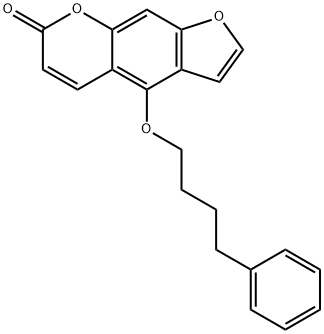Description
Psora 4 is an inhibitor of voltage-gated potassium channels (K
v1.3; EC
50 = 3 nM). It is selective for K
v1.3 over K
v1.1, K
v1.2, K
v1.4, K
v1.7, and K
v3.1 channels (EC
50s = 62, 49, 202, 100, and 1,500 nM, respectively) but does inhibit the K
v1.5 channel (EC
50 = 7.7 nM). Psora 4 selectively binds to the C-type inactivated state of the K
v1.3 channel and inhibits potassium current in a use-dependent manner. It has immunosuppressive activity, inhibiting proliferation of human and rat myelin-specific effector memory T cells
in vitro (TEM cells; EC
50s = 25 and 60 nM, respectively).
Uses
Psora-4 is the most potent small-molecule Kv1.3 blocker known. Psora-4 and other Kv1.3 blockers may be useful as immunomodulators for the therapy of autoimmune disorders.
Definition
ChEBI: Psora 4 is a member of the class of psoralens that is psoralen substituted by a 4-phenylbutoxy group at position 5. It is a potent inhibitor of the voltage-gated potassium channel Kv1.3 (EC50 = 3 nM). It has a role as a geroprotector, a potassium channel blocker and an immunosuppressive agent. It is a member of benzenes, an aromatic ether and a member of psoralens.
Biochem/physiol Actions
The lymphocyte potassium channel Kv1.3 is regarded as a new target for immunosuppression. Psora-4 is the most potent small-molecule Kv1.3 blocker known. It blocked Kv1.3 in a use-dependent manner, with a Hill coefficient of 2 and an EC50 value of 3 nM, by preferentially binding to the C-type inactivated state of the channel. It exhibited 17- to 70-fold selectivity for Kv1.3 over closely related Kv1-family channels (Kv1.1, Kv1.2, Kv1.4, and Kv1.7) with the exception of Kv1.5 (EC50, 7.7 nM) and showed no effect on human ether-a-go-go-related channel, Kv3.1, the calcium-activated K+ channels (IKCa1, SK1-SK3, and BKCa), or the neuronal NaV1.2 channel. In a test of in vivo toxicity in rats, Psora-4 did not display any signs of acute toxicity after five daily subcutaneous injections at 33 mg/kg body weight. Psora-4 selectively suppressed the proliferation of human and rat myelin-specific effector memory T cells with EC50 values of 25 and 60 nM, respectively, without persistently suppressing peripheral blood naive and central memory T cells. Because autoantigen-specific effector memory T cells contribute to the pathogenesis of T cell-mediated autoimmune diseases such as multiple sclerosis, Psora-4 and other Kv1.3 blockers may be useful as immunomodulators for the therapy of autoimmune disord.
in vitro
psora-4 could block kv1.3 in a dose-dependent manner. psora-4 was found to be the most potent small-molecule kv1.3 blocker known. psora-4 exhibited 17- to 70-fold selectivity for kv1.3 over kv1-family channels including kv1.1, kv1.2, kv1.4, and kv1.7 and also showed no effect on human ether-a-go-go-related channel, kv3.1, or the neuronal nav1.2 channel. in addition, psora-4 could suppress the proliferation of rat and human myelin-specific effector memory t cells with ec50 values of 60 and 25 nm, respectively, without persistently suppressing the peripheral blood naive and central memory t cells [1].
in vivo
in a study of in vivo toxicity in rats, psora-4 was found not to show any signs of acute toxicity following five daily subcutaneous injections at 33 mg/kg body weight [1].
References
[1] vennekamp j,wulff h,beeton c,calabresi pa,grissmer s,hnsel w,chandy kg. kv1.3-blocking 5-phenylalkoxypsoralens: a new class of immunomodulators. mol pharmacol.2004 jun;65(6):1364-74.


